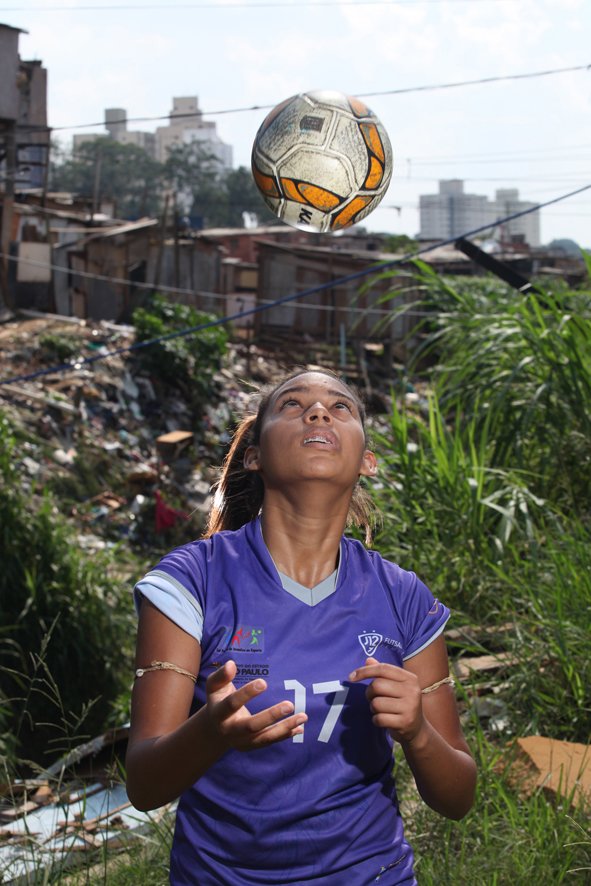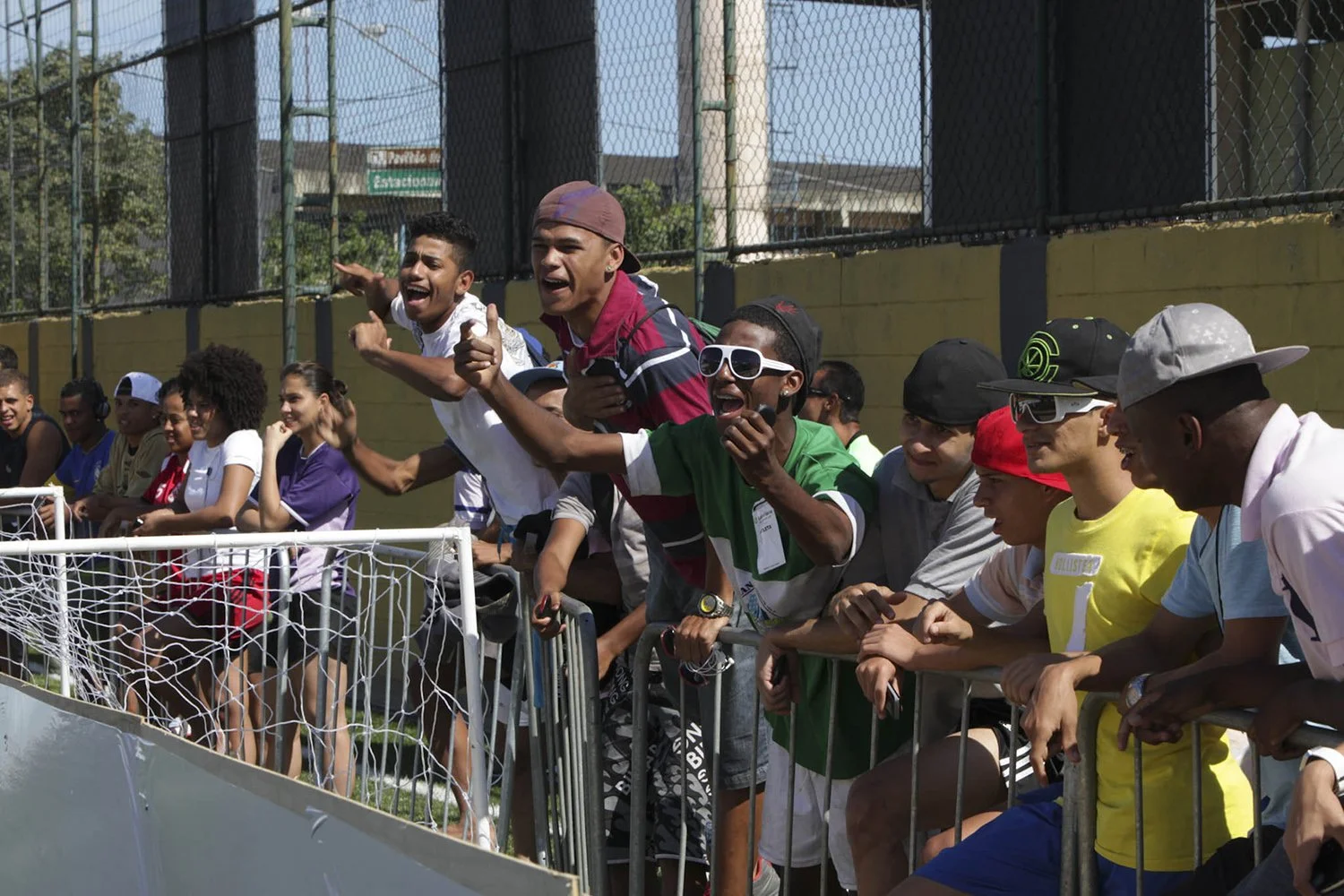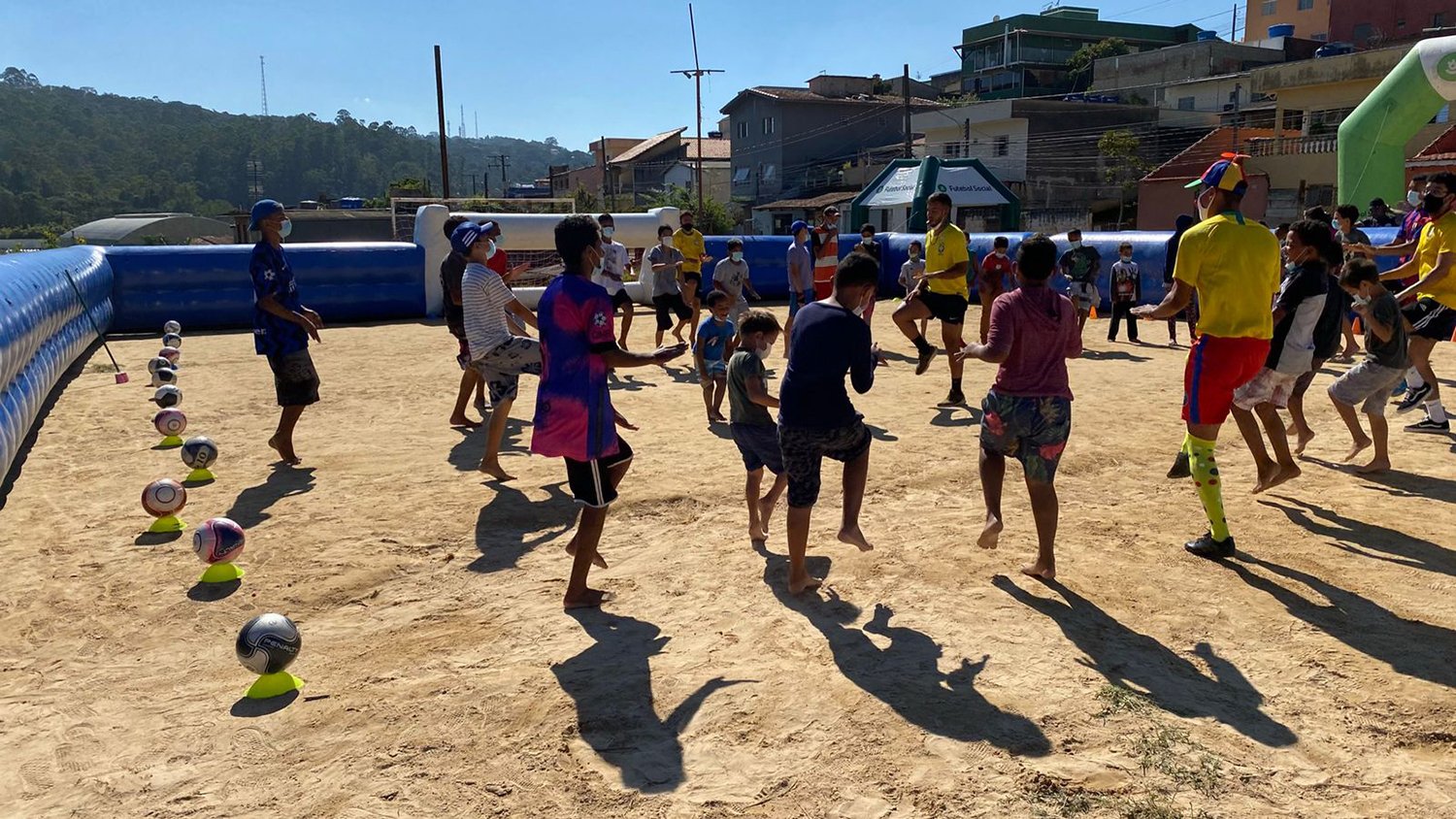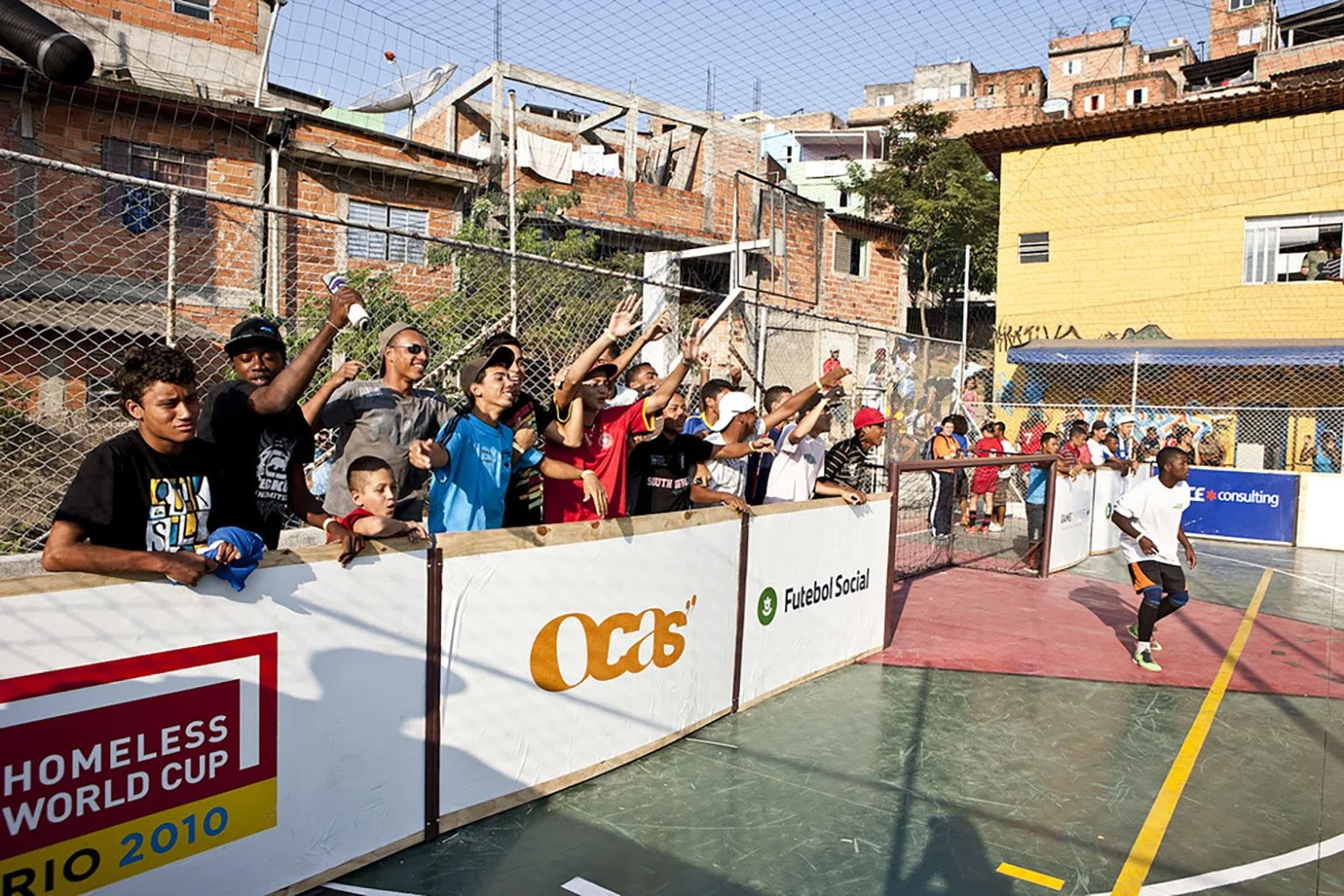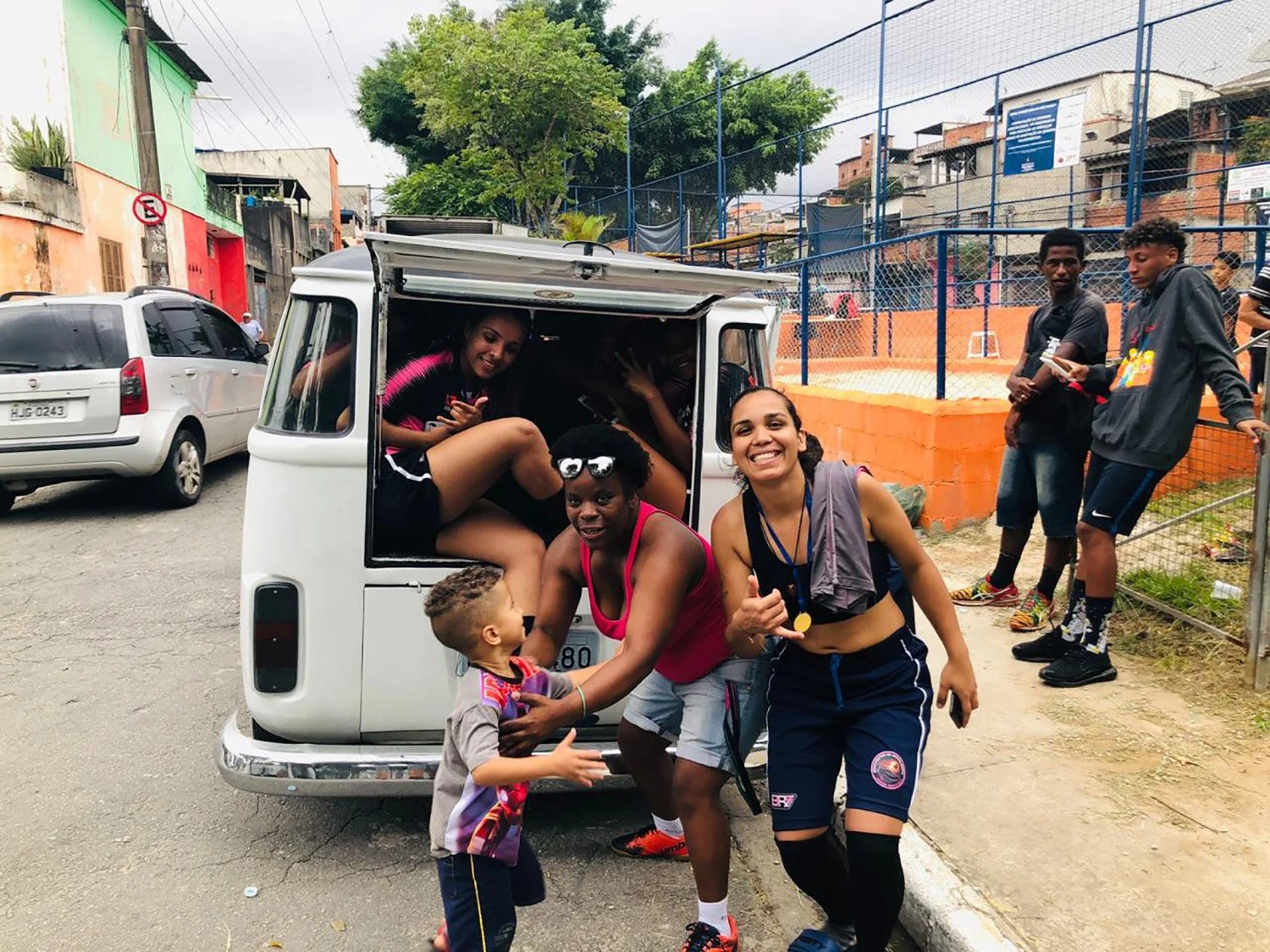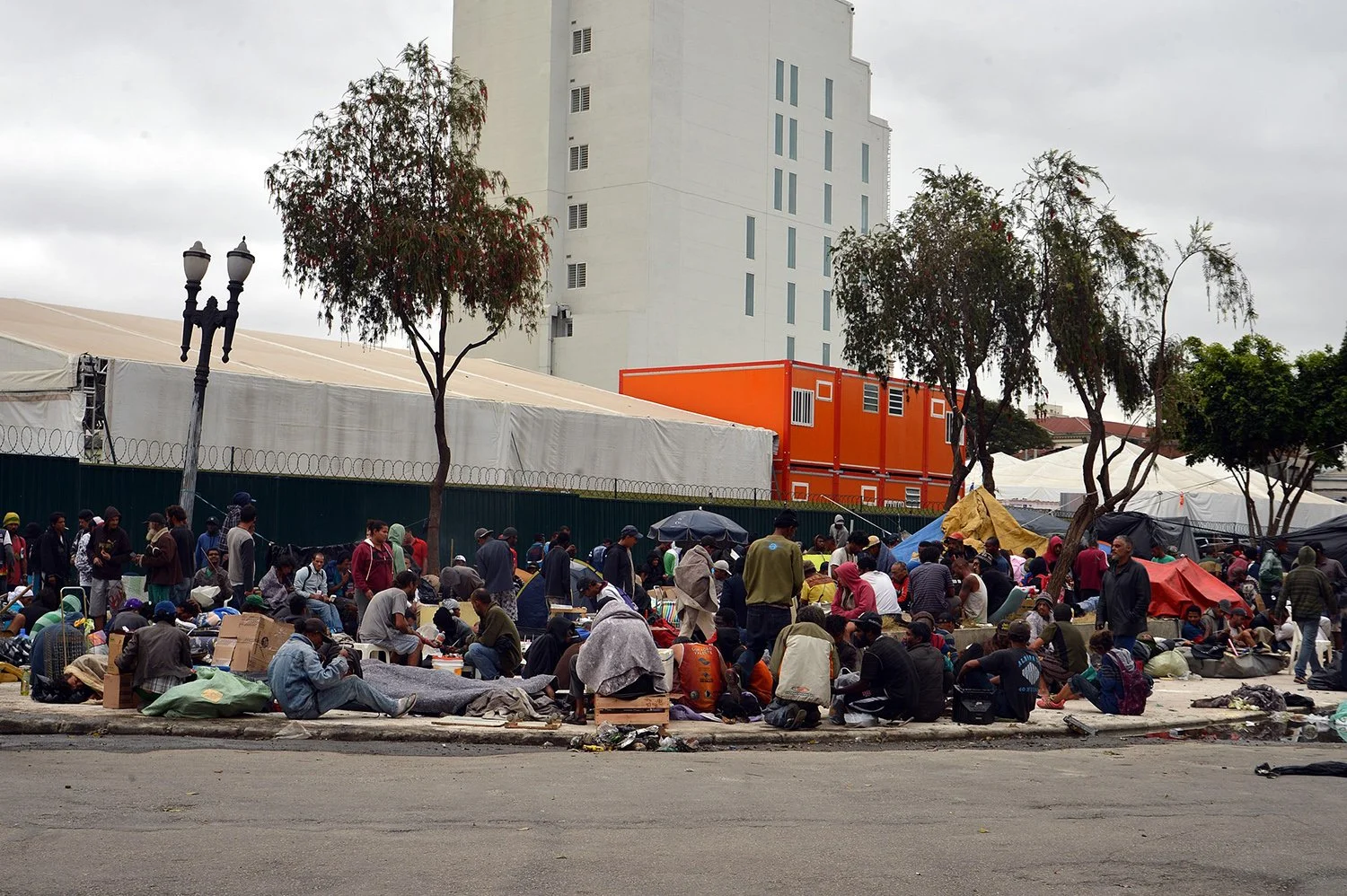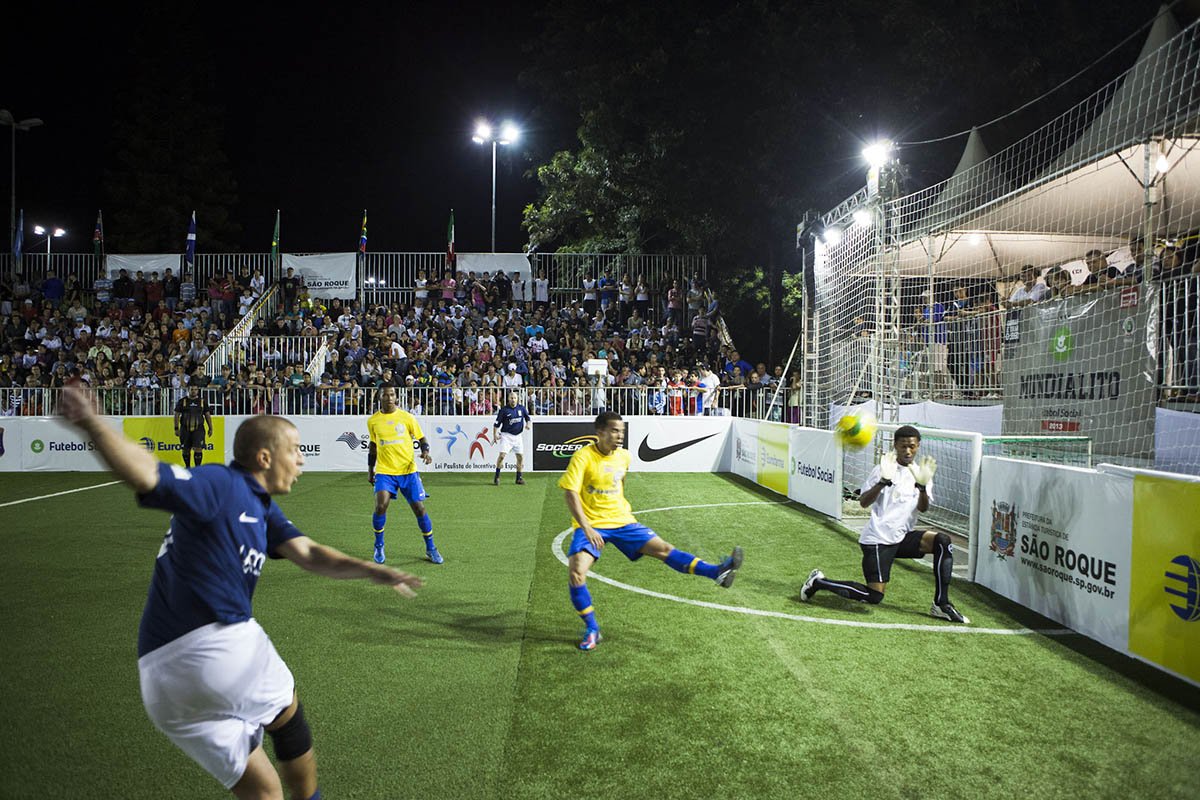More Than A Game: Brazil
Since the Homeless World Cup was established in 2003, Brazil have brought a team to every tournament. The HWC took place in Rio de Janeiro in 2010, with both the men and women’s teams winning the competition.
“Social football made me dream again”
Image: Futebol Social
Our partner in Brazil is Futebol Social, they provide sport and social training for players at regional level and organise tournaments across Brazil.
Brazil is ‘o País do Futebol’ – the country of football. From the vast city favelas to the rural communities, as football legend Pele said: “Brazil eats, sleeps and drinks football. It lives football!”
Someone who has lived and breathed football all her life is Patricia Ferreira Alves. Growing up as one of nine with eight brothers, she has always played football.
“Football taught me that I can share a ball with 10 other people, and this taught me to share in life, sharing the love I have inside me, sharing bread and everything I can. It made me better.”
She even gave her spare shoes to the Indian players at the Homeless World Cup in Mexico in 2018.
“They were wearing tennis shoes; they didn’t have football shoes and me and the girls from my team in Brazil we decided to take ours off, to give to them. That impressed me, knowing that football transforms people with small gestures, after that my heart was filled even more with what I wanted in my life – to continue in football, but to be a player focusing on good.”
Patricia is one of thousands of players who have taken part in Futebol Social’s tournament series, the ‘Futebol Social Circuit.’
Speaking in 2018 Patricia said: “Social football made me dream again, it made me believe that I am capable. If I become a professional, it is because of the strength that social football gave me.
|Futebol Social bring together people from across Brazil to play football. Photo: Futebol Social
Futebol Social has created a network bringing together more than 100+ grassroots organisations across Brazil, that all believe that football is key to helping people out of poverty.
The grassroots organisations work with around 10,000 players, with 2,000 taking part in regional tournaments in their tournament series the ‘Futebol Social Circuit’.
“We are building a network; we are not reinventing social work that they already do so well in the community,” Guilherme Araujo from Futebol Social explains.
From the regional tournaments, 86 players are selected for the national tournament. This acts as trials for the Homeless World Cup squad, with 8 men and 8 women typically selected to represent Brazil.
“[The Homeless World Cup] changes people’s lives forever, it opens doors that will never be closed again. Players are different and they have the power to transform their situations.”
But what is the context of their work and why is it so essential?
THE MANY FACES OF BRAZILIAN POVERTY
Homelessness and housing in Brazil is complicated. Brazil is almost its own continent, not only because of its vast size (it is the fifth largest country in the world) but also because of the diversity of the people and communities who live there.
From the favelas and suburbs in the country’s major cities, to the rural Amazonian communities living in the North of the country, the mix of the backgrounds of people Futebol Social welcome to their tournaments is broad.
“When we bring these players together, you can imagine how transforming it is. It’s like meeting people from other countries.” Despite the wide range of backgrounds, they have one thing in common: “all of them are suffering with the same problems, relating to unstable housing, poverty, and violence.”
| Futebol Social bring football tournaments to communities across Brazil. Photo: Futebol Social
Guilherme Araujo explains, this needs to change. “We need to take care of our people, there is no rich country if people are living in a terrible situation. People are living on the street, there is no food, things are more and more expensive every day. We are getting worse year after year.
“People don’t have to be living on the streets, or in a shelter to be homeless in Brazil. The situation is much worse if we look beyond this view of homelessness.
“There are people who depend on the forest and the river, they live isolated, abandoned, with very poor housing conditions, with very little food or infrastructure. It’s another face of Brazilian poverty.”
By working with local communities in these areas, Futebol Social brings these groups together at their tournaments and give them a chance to learn from one another.
A RAINBOW NATION?
Where people live and grow up isn’t just circumstantial, Guilherme explains historical racism plays a substantial role.
Brazil is often referred to as the ‘rainbow nation’, celebrated for its racial equality and diversity. However, it’s evident when speaking to Guilherme that there are only pots of gold at the end of some people’s rainbows. And he explains, it’s largely dependent on the colour
of your skin.
“Brazil used to be an example and now we are a bad example for the world in every aspect; with the population, with how we treat poor people, with the Indians, we opened the Indian territories to extract gold. This is incredible. This was controlled and in the last two, three, four years we are undoing everything.
“Racism is a critical problem here. Poor people in Brazil are mainly black. People try to pretend that racism doesn’t exist in Brazil but all you need to do is look at who lives in a favela, who is in good restaurants, in the malls, in the companies and in the offices.
“We have a social structure where black people are kept away from where white people live. It’s very segregated. People from outside don’t see this in Brazil as it is in South Africa for example, but it’s a real problem.
| The starkness of wealth is hard to ignore in cities like Rio de Janeiro where multimillion dollar apartments are a mere 100 metres from the favelas. Photo: AHLN
“Brazil is the place where you have 10% of the population with power and money and 90% in inadequate situations,” said Guilherme.
The starkness of wealth is hard to ignore in cities like Rio de Janeiro where multimillion dollar apartments are a mere 100 metres from the favelas, which have no wastewater and high levels of crime. This is a problem, Guilherme explains, which stems from colonisation.
“People pretend that it isn’t their problem and convince themselves, people are there because they want to be, because they don’t work, because they’re involved in crime, because they don’t know how to make money.
“However, this is a situation that comes from 100 of years since the European came and brought the Africans as slaves and the situation remains similar. ‘I make a lot of money and you need to work for me for little money and it’s your problem to live and have what you want’.”
INSIDE BRAZIL’S FAVELAS AND SUBURBS
|The pitch from the HWC in Rio in 2010 is now being used in São Paulo. Photo: Futebol Social
“We know these places. They are fantastic places, they are good places, but there are no basic living conditions. It’s a country inside a country.”
Basic infrastructure such as wastewater is often missing from the favelas, and housing is often insecure.
“If it rains you have water inside your house. If it’s too warm you cannot sleep. If it’s too cold, you need to put fire inside your house. You don’t have food to give to your children.
“We need to show these youngsters that they can have a good life and they don’t need to live in that place forever. They need to have conditions to transform the place.”
There are also high levels of crime because of gangs.
“Drug dealers control entire territories, the police are not welcome here, there is no security. They maintain their control using violence.
“You take a main favela in Rio or São Paulo; we are speaking about 100,000 people living in a favela. Perhaps you have a gang of 100 or 200 people.
“That’s a very important concept, the people who live there, they are workers, they are not involved in the criminal activity, but they are controlled by this violence and these violent gangs.”
|Photo: Futebol Social
“CRACK AND COCAINE ARE ALMOST AN EPIDEMIC IN BRAZIL”
“This is the sort of territory where one of these gangs are very present because they make a lot of money. They sell thousands of ‘rocks’ because each of these guys smoke ten, twenty, thirty every day.”
Drug addiction has a direct correlation with homelessness and once people are addicted to drugs, it’s hard to escape and Guilherme explains the government can’t stop it without a structured and integrated plan.
“Homelessness is a consequence, when you’re in a such a vulnerable situation, the impact of drugs, especially crack, it’s terrible.”
“It’s cheaper than other drugs and you know the power of dependence is incredible. Some of them may turn to crime to make money for drugs. This is something very critical. This is something that needs to end,” said Guilherme.
|Cracolândia – it’s like Disneyland for Crack addicts” Photo: Agência Brasil Fotografias, CC
Cracolândia makes up only a small part of the picture of homelessness in São Paulo. Approximately 1000-2000 people live there, making up 3-6% of the total homeless population in the city, which currently is estimated at 30,000. Other people live on the streets in other parts of the city, in public shelters and in insecure housing.
It’s important to remember that despite drugs being a major issue in Brazil, it does not affect everyone who is homeless. This is something Guilherme makes a point to explain, “this idea that everyone who is homeless is associated with drug addiction is absolutely not true.”
However, for those who are affected by drugs and addiction, he explains, there needs to be a “structured and special social network of support” for them to overcome it.
CHANGING LIVES
This special support network and sense of community is what Futebol Social create. Through their work with their partners, Guilherme and the team give players a chance to compete competitively and meet people facing similar challenges.
|“We need to empower them to realise a new life is possible.” Photo: Futebol Social
It also gives them distance and time away from their day-to-day struggles and a chance to believe that another life is possible.
“People are trapped in areas with high levels of violence, with drug dealers and clashes with the police, where people are being killed. It’s something that is natural in their lives, to sleep with the sound of guns and pistols and death. It is something normal. We need to empower them to realise and make sure that a new life is possible.”
Guilherme and the team hope that by showing the players an alternative way of life, they will give them the confidence, skills, and support to change their lives.
“Sometimes it’s a surprise for us how people can change their lives.”
They have hundreds of stories of former players who have managed to transform their lives. Some who have come to the Homeless World Cup and others who have been involved in their regional tournaments.
Despite the struggles in the country with drug addiction, gang violence and insecure housing, one thing is certain, Futebol Social has shown that the rainbow nation truly is possible, and it can start on the football pitch.
Find out more about Futebol Social’s work in Brazil and how they’re using football to end homelessness and tackle social isolation.
Words: Rebecca Corbett

